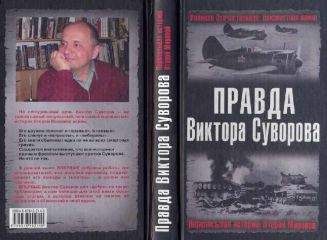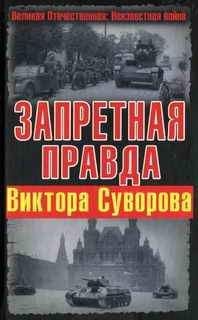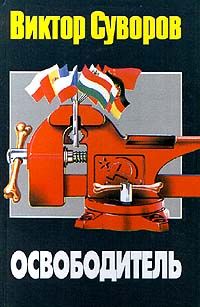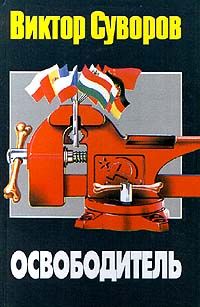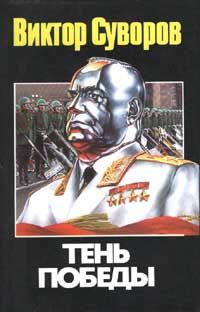Виктор Суворов - ПРАВДА ВИКТОРА СУВОРОВА
Надо отметить, что существенным пунктом возражений одного из критиков является сам факт проведения заседания Политбюро 19 августа 1939 г. Переводчик Молотова (а позже и Сталина) В.Н. Павлов, отвечая на вопросы советского военного историка П.А. Жилина в 1972 г., сказал, что Сталин был инициатором подготовки договора с Германией и собственноручно подготовил проект документа, который действительно «обсуждался в Политбюро». В Наркоминделе, по его словам, «такой документ не готовился и не обсуждался». Логично предположить, что в Кремле таким же образом был подготовлен еще один документ, а именно «Директивы».
Следовательно, несмотря на некоторые интересные и полезные находки, содержащиеся в исследованиях двух претендующих на окончательный анализ авторов, их суждения так же, как и мнения других, менее педантичных историков-критиков, да и самого Сталина, по поводу текста его речи 19 августа 1939 г., следует признать несостоятельными. Критики пытаются отрицать аутентичность заведомо искаженного, подвергнутого цензурной и редакторской правке текста, напечатанного сначала во французских газетах, а позднее в научном журнале в Женеве.
В наше время, через 67 лет после первой публикации, речь Сталина от 19 августа 1939 г. в ее оригинальной версии следует рассматривать как ценный исторический текст, подлинность которого никогда не была серьезно оспорена.
Очевидно, что включение этого текста в исторический канон может потребовать решения давно назревшей задачи масштабного пересмотра истории Второй мировой войны и обстоятельств, ей предшествовавших, а также причин, приведших к холодной войне.
В предвоенные годы многие хорошо осведомленные дипломаты, «знатоки Москвы», такие как Джордж Ф. Кеннан (George F. Kennan) из США, Жан Пайар (Jean Payart) из Франции, Юлиус Лукашевич (Juliusz Lukasiewicz) и Вацлав Гржибовский (Waclaw Grzybowski) из Польши, Фридрих фон дер Шуленбург (Friedrich von der Schulenburg) и Эрнст Кестринг (Ernst Kostring) из Германии, утверждали, что Сталин хотел большой войны в Европе, чтобы ослабить ее и тем самым создать условия, при которых Красная Армия могла бы осуществить «большевизацию» стран к западу от границ Советского Союза. Их анализ того, как Советы намеревались использовать грядущую «Великую войну», оказались подтверждены текстами речи Сталина от 19 августа 1939 г. и «Директив». Явное стремление некоторых историков примкнуть к Сталину, годами опровергая подлинность его речи, само по себе должно стать предметом серьезного профессионального внимания.
Приложение 1
Перевод на английский язык оригинального немецкого текста речи Сталина на заседании Политбюро от 19 августа 1939 г., полученного от французского агентства «Havas» по телеграфу из Женевы 27 ноября 1939 г. В ходе этого перевода особое внимание было уделено передаче смысла в соответствии с существующими французскими версиями текста того времени. В немецком переводе оригинальной женевской телеграфной копии речи Сталина и поясняющего сопроводительного текста, полученных через французское официальное агентство новостей «Гавас», абзацы, выделенные ниже, отсутствовали. Они приводились в соответствие с абзацами французских версий речи всякий раз, когда, отличаясь по языку, были очень близки или идентичны по содержанию.
Вставки в квадратных скобках в нижеследующем тексте сделаны с пояснительной целью.
[Deutsches Nachrichtenbiiro (DNB)]
FOREIGN NEWS AGENCIES
NO. 724, Berlin, 28.11.39
Completed 11.00
E/Kg
Havas
28.11.
Geneva
Why did Soviet Russia sign a Pact with Germany? The world community has asked this question for some time — and it continues to ask. What moved the government of the Soviet Union to sign political and economic treaties with Germany on October 19 [1939]? Until now we have not known what the conditions were under which Stalin received the unanimous approval of the Politbiuro for this shift in his policy. Now, today, the veil has been lifted.
We have received from Moscow, from a source which we consider to be absolutely trustworthy, the following detailed information on the meeting held, at Stalin's initiative, on August 19 [1939] at 10 p.m., and the speech that he delivered there for the occasion. On August 19, in the evening, Politbiuro members were urgently called together for an urgent and secret meeting, which was also attended by prominent leaders of the Comintern, but only those from its Russian section. Not one of the foreign Communists, not even [Georgii] Dimitrov, Secretary General of the Comintern, were invited to this meeting, whose purpose, not indicated on the agenda, was to hear Stalin's report.
Stalin began to speak immediately, saying in essence the following: «Peace or war. The issue has come to a critical pass. Its resolution will depend wholly on the position that will be taken by the Soviet Union. We are absolutely convinced that, should we conclude a treaty of alliance with France and Great Britain, Germany will be forced to remove its pressure from Poland and seek a modus vivendi with the Western powers. In this way, war might be avoided, but subsequent developments with respect to us will take on a dangerous character.
«On the other hand, if we accept Germany's proposal, which you know, is to conclude a nonaggression pact with it, it will undoubtedly attack Poland. Then the entry of England and France [into this war] will become inevitable.
«In such circumstances, we will have good prospects of remaining outside the conflict and, taking advantage of our position, we will be able to await our turn. This is just what our interests demand.
«Our choice is therefore clear: We must accept the German proposal and send the English and French delegations [at that time on hand for negotiations in Moscow] back home with a courteous refusal.
«It is not difficult to foresee the advantage that we shall gain from this
course of action. It is obvious to us that Poland will be destroyed before England and France are at all in a situation to come to her assistance. In this case, Germany will turn over to us a part of Poland right up to the limits of Warsaw, including Ukrainian Galicia.
«Germany will give us full freedom of action in the three Baltic states. It will not oppose the return of Bessarabia to Russia [sic]. It will be prepared to yield to us Romania, Bulgaria, and Hungary as a sphere of influence.
«Only the question of Yugoslavia remains open, its resolution depending on the position taken by Italy. If Italy remains on the side of Germany, then the latter will demand that Yugoslavia enter the zone of its influence. Through Yugoslavia it will obtain access to the Adriatic Sea. However, if Italy does not enter [the war] with Germany, then it will obtain access to the Adriatic Sea through Italy, and in this case Yugoslavia will pass into our sphere of influence.
«We must, however, keep in sight the possibility that Germany will emerge from the war as loser, and not as victor.
«Let us examine the case of its defeat. In this case, England and France will still be strong enough to occupy Berlin and to destroy a Soviet Germany, and we shall not be in the situation to come effectively to the help of a Soviet Germany.
«Our goal therefore requires that Germany should wage war as long as possible so that England and France grow sufficiently weary and exhausted and are unable to destroy a Soviet Germany.
«Our position will derive from this consideration: While remaining neutral, we will help Germany economically, providing it with raw materials and foodstuffs. But our assistance, it should go without saying, must not exceed a certain limit in order not to damage our economy or weaken the power of our army.
«At the same time, we must carry out an active Communist propaganda, especially in countries of the Anglo-French bloc and, above all, in France. We must be prepared for the situation. In that country in wartime our party will be forced to abandon the path of legality to shift to clandestine operations. We know that such activities require large resources, but we must unhesitatingly make the sacrifices. If this preparatory work is carried out thoroughly, the security of a Soviet Germany will be assured. That situation will contribute to the Sovietization of France.
«In order to achieve this goal, we must, as I said at first, insure that the war lasts as long as possible and that we devote toward this end the resources which we have.
«Now let us examine the second hypothesis, that of a German victory.
«Some believe that such a possibility would represent the gravest danger for us. There is a particle of truth in this assertion. But it would be an error to assume that this danger is as immediate and as great as some imagine.
«If Germany wins, it will emerge from the war too exhausted to wage war on us during the next decade. Its principal concern will be to keep watch on defeated England and France in order to prevent their rising up again.
«Moreover, a victorious Germany will have vast colonies. Their exploitation and adaptation to German procedures will also occupy Germany for several decades. It is patent that Germany will be too busy elsewhere to turn against us.
«Comrades», Stalin concluded, «I have given you an insight into my considerations. I repeat that it is in your interest that a war should break out between the Germany and the Anglo-French bloc. For us it is crucial that this war last as long as possible, so that both sides emerge exhausted. For these reasons we must accept the pact proposed by Germany and do everything possible so that this war, once begun, lasts as long as possible. At the same time, we must intensify our propaganda work in the belligerent states in order to be well prepared for the moment when the war ends».
Stalin's speech, listened to with reverential attention, was not followed by any discussion.Only two insignificant questions were asked, which Stalin answered. His proposal, that the Non-Aggression Pact with Germany be accepted, was adopted unanimously. Subsequently the Politbiuro adopted a decision to charge [Dmitri Z.] Manuil'skii, the president of the Comintern, with working out jointly with Dimitrov, its general secretary, under Stalin's personal direction, appropriate instructions to be passed to the Communist Party abroad.
Приложение 2
Английский перевод документа, озаглавленного «Официальные правительственные директивы Москвы дипломатическим миссиям СССР на Балканах», был сделан автором статьи с архивных копий, существующих на французском и немецком языках. Немецкая версия считается переводом с румынского оригинала. Перехваченные «Директивы» после перевода на французский язык были переданы дипломатическим представителям Великобритании и Франции премьер-министром Румынии Армандом Калинеску (Armand Calinescu) в начале сентября 1939 г. Немецкий посол сообщал в сопроводительном письме своему министру иностранных дел, что он тоже получил копию на французском языке (которая послужила одним из источников для нижеследующего перевода на английский язык) из другого источника в Румынии и что изначально он пришел из г. Варны в Болгарии.
OFFICIAL GOVERNMENT INSTRUCTIONS SENT FROM MOSCOW
TO DIPLOMATIC MISSIONS OF THE USSR ESTABLISHED
IN THE BALKANS
«The Comintern sent the following official communique to all Communist parties in the Balkans.
1. Russia [sic] has realized that it is time to abandon the tactics adopted by the seventh congress of the Comintern held in 1933. It must be acknowledged that, owing to these tactics, our Communist Party was able to conclude alliances with bourgeois and democratic states in order to stop the fascist wave, which was spreading rapidly. Owing to these tactics, we were also able to impede the triumph and the establishment of fascism in France in 1933.
2. The desire of France and England to draw the USSR into the peace front is based on a calculation clear to anyone. The two countries in tended to destroy the Rome-Berlin Axis, largely employing the forces of our country for this purpose.
This combination was very disadvantageous for us. We would have helped to rescue Anglo-French imperialism, which would have represented an absolute violation of our principles. [Yet] these principles by no means rule out a temporary agreement with our common enemy, fascism. But, whatever its nature, an agreement with the bourgeoisie would serve to strengthen the bourgeoisie and capitalism, which is absolutely contrary to our principles.
